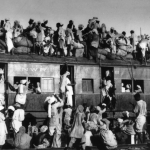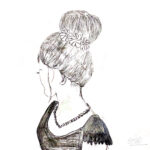A soul is departed from the living earth. Where to, no one really knows. As her body warmth climbs down and reaches zero, her memories, once treasured souvenirs too, start to leave her surroundings. An auction of a dead person’s belongings by her loved ones is just a regular activity in modern day culture. Thousands of years back, those belongings were buried along with the departed. In the cosmopolitan world we live in, it does not make sense and the way the world has evolved does not support that idea any longer. For once there is no space and secondly it doesn’t make sense to destroy what is reusable in a world that is scared of resources. Besides, who has the money to build a Giza or a Taj Mahal?What could be reused should be reused and what could be sold should be sold. There is no ethical conundrum of that.
Well, of course there are exceptions and exceptional situations. If you were a world leader, a persona who was responsible for changing the course of humanity, the world would guard and preserve everything that belongs to you. Perhaps even your T-shirt. Or perhaps if you were an equal of Lenin, they might even preserve your dead body. If you were a larger than life person, your legacy perdures your after life on earth.Tutankhamun wouldn’t have thought of becoming a global sensation 3300 years after his departure, probably. But such could be life on earth.
Personal property of a deceased is called fittings or chattels. Although distributing them among family or selling that brings no legal challenge, the sentimental value could be quite a disturbing occurrence. Such auctions are a sad reminder of a constant echo we try hard to ignore, a truth that disturbs peace and gives birth to sentiments not necessarily happy. The stark reminder of the emptiness of our life! As children, lovers, partners, husbands, wives, parents, grandparents, friends, work colleagues humans play multiple roles throughout their lives. They take pictures, purchase furniture, buy souvenirs, gather treasures, collect things of interest. All of those possessions make who a person is. A carpet collector, a vass collector, a paintings collector or what not. Even in the poorest of the houses, they will preserve a picture of the family. Each of those items means something to the owner who is gone on a journey to the unknown. Each of them completes who one is. But as one lies dead in a far away cemetery alone, or burnt and scattered as ash, their loved ones rips the world they built for years. One buy one they sell what made a person, shred their possession like removing bricks of a house. From the favorite reclining chairs, to the rich book collection to one’s utilities. At the end perhaps the house one lived in would also be sold. After a while there is absolutely nothing that will remain of who one once was. There can not be billions of Tutankhamuns in an overpopulated world where people die by hunger.
A minimalist thus would be the real winner in a life’s journey when one thinks of this truth. A minimalist would live with the means to live but not necessarily to possess the possessions purchased out of greed. But even while knowing a hard truth people would not choose to follow the path of minimalism.Minimalist or not, you will be met with the maker one day. So what difference does it really make? When what’s on the other side is not known, why worry about suppressing your cravings. Why not enjoy the materialistic riches and appease your soul’s greed ? Who gave those words a bad name ? If religions were meant to guide humanity for a simple life, why do all the religious establishments remain so rich, painted in gold, draped in gems and showered in wealth ? Something is broken in that system or humanity supports a fraud because it has been the tradition.
When humanity was organising into a civilization, they had to think of what and how the order would look like. First to be born were the leaders. Those selfless, strong men fought with their muscles against the wild beasts competing for dominance like their human counterparts. It was a savage battle for control,food, land, populating and becoming the alpha beings of the earth. Often it was the animals who won with their might, sharp teeth, piercing nails, lightning speed, strongest senses from smell to sight. Humans were the prey. The battles for water holes, battles for an innocent impala favoured the wild beasts as they were gifted with extraordinary savagery. Then one day it all changed. A human whose name we could never know discovered the single most important discovery of our entire civilisation. Fire !!! Fire and ignition of it made our history what it is and us who we are.
Predating the fire or just after the discovery of fire, there were no organised religions. Perhaps one worshiped the forest which gave them food and shelter or the rain which helped them cultivate their grain or the sun that made life blossom. Who created the organised religion and for what reason could only be defined looking at how the current world functions. Who would need the protection of divinity, cover of the holy, blessings of the almighty and the endorsement of the high priests the most ? Not a human dying from starvation or a war that he had no part to play with ;not a poor voter who has been taken on ride after ride by every government ; not a migrant dying in the high seas.
Maybe it is the very leaders who lead humanity that really need the organised religions to organise the society and tame their thoughts to suit their tunes. Looking at Tutankhamun and an auction of the chattels of an ordinary dead human of our time, all one could conclude is that life has always favoured the rich and mighty. They would live gloriously while they are alive and even after their deaths. While those Toms, Dicks and Harrys will see their chattels sold, lands distributed, names forgotten before the dawn of another year, it will only be a Tutankhamun who will emerge from a hidden cave, sunken palace and be placed in a Royal museum with their wealth intact.
About the Writer
 With a master’s in International relations, Dhanuka’s expertise is in Geopolitics and Geoeconomics, among other things. In addition to being the Executive Editor of The Asian Reviews magazine, he works as a guest writer in the Chicago-based Armenian Mirror-Spectator on Caucuses-related geopolitical issues and contributes as a columnist and a guest speaker to the Indian-based Force Security magazine.
With a master’s in International relations, Dhanuka’s expertise is in Geopolitics and Geoeconomics, among other things. In addition to being the Executive Editor of The Asian Reviews magazine, he works as a guest writer in the Chicago-based Armenian Mirror-Spectator on Caucuses-related geopolitical issues and contributes as a columnist and a guest speaker to the Indian-based Force Security magazine.
He was a grassroots Politician, a political campaign Director, and a council member of a local government body in a small town in rural Sri Lanka. Before entering active politics, he led his foundation in supporting youth and the underprivileged. Currently, he consults youth groups on political activism and general political trends.
He is a poet, blogger, and an enthusiastic climate and social activist who strongly believes in making a better world for future generations. A patriotic Sri Lankan who is a father of a loving daughter.







